My Journey, Part 2
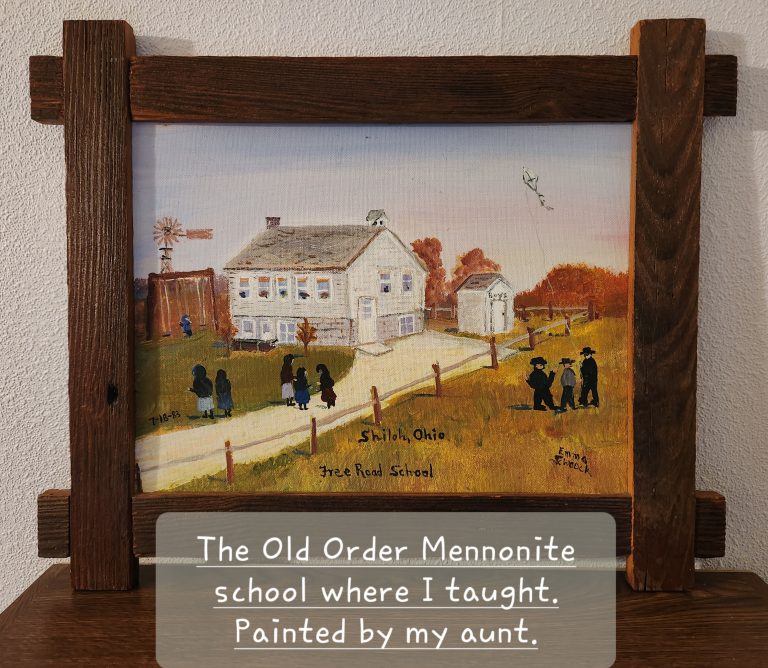
By Aleta Schrock
Continued from Part 1.
After I had returned home from teaching at the Old Order Mennonite church school in Ohio, I worked as a nurse’s aide in a local nursing home. I enjoyed my new job, but my heart longed to be back in the classroom teaching children. One day I drove by a church with a sign that they were hiring teachers. I called the number, but they required I attend their church in order to teach at their school and I was unwilling to leave my newfound church and friends. For a moment I despaired. How would I ever teach again if all the church schools required me to attend their church? Suddenly I had a “Duh!” moment. I had always wanted to go to college. This was my opportunity! I looked up the local college in South Bend (IUSB). The address was on Mishawaka Avenue. So I got on Mishawaka Avenue in Elkhart and drove until I ran out of road, but there was no IUSB in sight. I went back home and got better directions without telling anyone about my embarrassing error.
The following week I walked through the university’s halls talking with people in admissions, applying for grants, and signing up for classes. My GED English Scores were high enough to qualify me to begin some classes right away, but they required a prerequisite math class for me to qualify for college level math.
Several weeks later I attended my first class majoring in Elementary Education with an English Minor. It was hard working part-time and attending school full time, but it was a dream come true. I loved learning. In one of my initial literature classes my professor asked what we thought the author meant by a particular phrase in the book. An explosion of awe filled my brain and settled into the whole of who I was as I realized that I could decide for myself whether I believed what an author said. It shocked me that although I had already experienced generalizing ideas in my spiritual beliefs, I had not thought to extend it to the rest of my life.
As an Old Order Mennonite, I knew people watched us in public, but I had no idea how many side glances I had lived with until I walked the university hallways and felt uncomfortably invisible. It’s not that I wanted to be noticed. It’s that I had to accustom myself to this new experience of blending in. It was these subtleties that took me by surprise. I needed to relearn things that I had already been doing comfortably for years. A friend taught me how to do my hair. I bought a pink skirt and later found a blouse I thought would match. When I got the blouse home, I was shocked to discover that despite having spent my childhood coloring with a box of 64 crayons, I had never known there were that many shades of pink to be coordinated. I simplified that choice by exchanging the pink blouse for a white one. Restaurants and napkins were a new experience and I observed how my friends used their napkins. I watched closely to ensure I handled my silverware the same way they did. I learned how to drive on a stick shift. One time I barely made it up a hill with some cars waiting patiently behind me while others drove on around, my cheeks glowing red. My friend and I laughed hilariously when we discovered I was attempting the hill in fourth gear.
I soon began to feel overwhelmed and exhausted from all the newness.
In spite of their caring, none of my new friends could truly understand how difficult all these little adjustments were, along with those of reestablishing the relationships with my family. The most difficult part was losing my Old Order Mennonite community. That sense of oneness and connection that had enveloped every aspect of my life as an Old Order Mennonite was forever out of reach. That type of close-knit community can only exist within a cultural structure of everyone thinking, dressing, living, and believing within a defined framework. My mind had already broken out and even if my body would have returned, my mind could never again fit in precisely the same way as before. Being the introvert that I am, I never fully tried, nor was fully able to explain this phenomenon to my new friends. Outcast by choice from my old culture, my emotions were taut from not feeling as if I fully belonged in, or even knew how to, or even wanted to fit into this strange new culture. The once confident me had lost all confidence. I thought I was going crazy. I was scared that if I told anyone what I was experiencing mentally, they’d think I belonged in an asylum and I pictured white coats carting me away.
Then one morning God rescued me through my Anthropology class. The professor talked about a paragraph in the first column on the right-hand side of our textbook. He explained that when people from other countries move to America, they often experience many of those emotions listed in that paragraph. I recognized myself on that page and relief overwhelmed me. I was not going insane. I was experiencing culture shock. It was normal to feel what I was feeling in my situation. Once I knew I was okay and accepted my crazy emotions as momentarily normal, I began to heal. I taped a then current picture of me on my kitchen cupboard and every time I looked at the stranger in that photo, I reminded myself that that was the real me.
Shortly prior to my graduation in 1991, I was hired as a second-grade teacher in the South Bend Community School corporation in South Bend, Indiana. That is where I am still currently teaching. A professor’s wife was on the interviewing team. Later that professor told me that during the first portion of the interview I was so painfully shy that they thought I’d never make it as an inner-city teacher. But towards the end, when I brought out the portfolio of my student-teaching experiences and I began talking about the children, I lit up and transformed into a dynamically enthusiastic person, they then placed me on the A-list for hiring. In South Bend I have taught all the grades between kindergarten and fourth grade. My favorite is first. My passion is teaching first graders how to read and write. Currently I am working as a Title 1 teacher. I don’t have a classroom, instead I work with small groups of students from grades kindergarten through fifth. These students don’t qualify for special Education but are struggling to learn how to read. In 2006 I got a Masters in Creative Writing from an online university.
I love adventure and when I learned that Lilly Endowment out of Indianapolis, Indiana, offers grants for Indiana teachers to refresh themselves, I was all in. I have received their allotment of two grants. With the first grant a fellow teacher and I explored Haiti. I had been there with a mission’s group several years previously and had wanted to return. I noticed the children in Haiti were creative with the few resources they had. After my grant trip, I returned two more times and taught a one-day creative writing class for students and a teacher creativity workshop for teachers.
My second Lilly grant took my teacher friend, now turned principal, and I, along with our husbands, to storytelling festivals throughout Western Europe. We wandered through an old Irish village listening to storytellers. I looked in the River Severn under the Iron Bridge for trolls, but an English woman at the Iron Bridge Toll House reminded me quite sternly that trolls did not live in England. Oops! I had confused my Irish and English fairytales. From the Vatican, and a gondola ride in Venice, to a Swiss castle, on to Spain, and the Louvre, then more storytelling festivals in France and Germany… It was a five-week summer dream.
Fulbright and the government of Japan also offered grants to teachers, and I was accepted. I spent three weeks in Japan with teachers from across all fifty states attending governmental and cultural lectures, and visiting schools. On my free weekend I almost got lost on the Japanese subway trying to find a Storyteller performing at a small village library on the outskirts of Tokyo. My train had reached the point where the English/Japanese Subway signs had turned to Japanese only. I had no idea which train to get on and even if I got on the right train, I had no idea where to get off. In that moment of fear, the one thing that drove me on, despite the possibility of becoming irrevocably lost, was the thought of “what if…” What if I gave up and forever lived with the regret of not having heard the storyteller. I eventually found an English-speaking person who directed me to the right train. I got on the train trusting that I’d somehow figure out where to get off. After several stations a group of American expats entered the train and before exiting they told me to look for a train overpass in order to recognize my stop. Because of that “what if” choice I made, I have discovered the joy of hearing the rhythm of language by relaxing into a story told with words I have no ability to comprehend.
For eight years I had been trying to sell the house I was living in, which was jointly owned by my ex-husband and me. It had been in the middle of renovations when we divorced which made it difficult to sell. It finally sold only to reveal that he had a considerable amount of liens against the property and the sale fell through. Thankfully the crazy housing market last year priced my home at a value that paid off both the mortgage and the liens.
But that same crazy housing market caused every affordable home to be sold right out from under me and neither was there anything available to rent. With three weeks before the closing of my house, I sat staring at the map on Zillow reminding God of the words I had often heard the Old Order Mennonite Bishop repeat from the book of Psalms: “I have been young and now I am old, but I have never seen the righteous forsaken, nor their seed begging bread.” Suddenly a particular house my realtor had shown me the previous week, but which was slightly out of my price range, came to my attention along with the thought: “Offer them $25,000 less.” Of course, I laughed. No houses were selling for less. But my realtor contacted the sellers and they accepted. The only drawback was that smokers had lived in that house for thirty years.
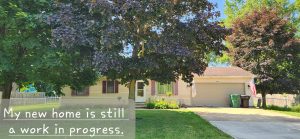
On the day of my twenty-minute move from my old house to the new, an amazing trove of family, friends, coworkers, and church people showed up to help in the transport of boxes and furniture and to tear out the old flooring and cover the walls with Kilz paint. The kitchen needed new cabinets and I’ve amazed myself at what I’ve been able to do with the occasional help of friends. I tore out the old kitchen cabinets and the soffit above it and painted and installed the new ones. It’s been a year’s journey of rewarding blood, sweat, and tears. I have a beautiful backyard and I’m in the process of planting a small orchard and building a raised garden bed.

I’m not sure what the future holds for me professionally. I still love working with children, but currently most public schools are not doing an efficient job of teaching students, especially in inner-city schools. The majority of the children are struggling both academically and behaviorally. The curriculum isn’t adequate and we are requiring primary students to learn abstract skills that are not developmentally appropriate. In the last few years, I’ve had conversations with teachers, principals, and superintendents about my concerns and they agree, but nothing ever changes. My teacher/principal friend that traveled with me throughout Haiti and Europe has retired this year. She has been speaking up also, to no avail. People higher up become upset when we speak too boldly. Some of the administrative people making important educational decisions have never taught school or don’t even have education degrees. We as educators are failing our next generation. A fourth grader recently reminded me that I’m not too old to initiate change. She asked my age. I told her I was turning sixty this summer. “You can’t be that old,” she responded incredulously. “You’re always happy and smiling.”
I am once again feeling that elusive longing for more of my Daddy God. A God with an infinite depth of being. A God who invites me to live in his dimension where the answers for all these overwhelming problems already exist.
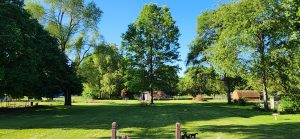
My backyard
My suggestions for people from plain churches that don’t allow higher education starts with earning your GED. Then think about what you enjoy doing and talk with a college counselor about what degree will help you do that. If finances are a challenge, take as many as possible of the required classes at a small local college where tuition is cheaper. Another alternative is to get your degree online. Make sure they are an accredited college/university. I’m glad I went in person for my bachelor and equally glad I went online for my masters. Also, read books and look up the definition and pronunciation of words you’re not familiar with. Listen to podcasts that teach science, history, and other interesting topics and look up definitions and spellings of unfamiliar words. These steps will all help ensure your success in college.
Recent Posts
To order a signed copy of my book(s), click on an image below. You will be taken to the books page of my author website to purchase.
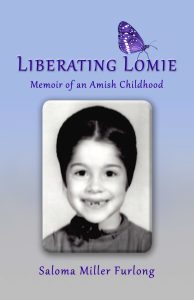
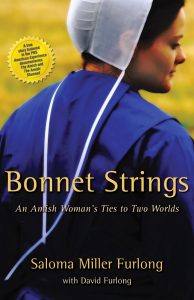
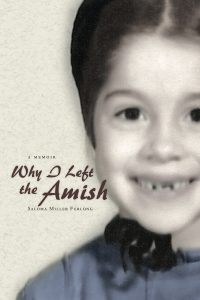
Cheers for finding your way, yourself, your teaching gifts, your friends, and your faith in your journey! And your lovely home!
Thank you, Nancy! It’s been a sometimes hard yet joyful and rewarding journey.
I loved this story, especially the part where the author talked about the faith she had when she was selling one house and buying another. It is a great reminder that God is faithful and what can seem impossible to us is not impossible to God. In His word He promises to never leave us or forsake us. What an amazing God we have.
Michele
Thank you, Michelle! I agree that those amazing God moments in our life are the best! He is faithful!
Aleta, your journey as an elementary school teacher and your enthusiasm for teaching moved me and reminded me of some of my own struggles when I was a teacher. You might be interested in reading The Dreamkeepers; Successful Teachers of African American Children, by Gloria Ladson-Billings. It came out in 1994, so it may be hard to find in libraries, but cheap used copies are available at https://www.addall.com/. It is very relevant for today’s teachers. Successful teaching in ‘inner city’ schools, which usually means schools with Black and brown children, means understanding how racism impacts the the way white administrators and teachers view Black and brown children, and how to recognize and use the strengths of these children. You’re right that few schools understand what these children need, but there are some. And like Ladson-Billings shows us, there are teachers who understand. You also might like to check out the Rethinking Schools magazine (https://rethinkingschools.org/) with lots of stories from teachers with powerful ideas about how and what to teach, models for initiating change in the schools.
Johanna Ruth, it’s wonderful to hear from a fellow educator! I look forward to reading The Dreamkeeper. I looked it up and the 3rd edition is in my Amazon cart! Thanks for the recommendation.
One of my favorite compliments from several parents over the years came in the form of them asking whether I was married to a black man. (My husband was white.) They commented on the respect I demonstrated to my black students, especially the boys.
While I was still Old Order Mennonite I would see African Americans at a distance and wonder what it would be like to have a black friend. After I left the Old Order church I attended a church that had a choir director who was AfricanAmerican. After several months of singing in the choir, it dawned on me that having a black friend was just like having any new friend. As humans, we all have our cultural differences along with similarities. I had as many cultural differences with a mainstream white person as I did with any person of color.
While I don’t believe in having favorites in my classroom, I must admit my heart was always towards the angry, disruptive child. I love the challenge of speaking life into their wounded hearts and watching them transform as our relationship strengthened. And in my experiences, the angry, disruptive children came in all colors.
It breaks my heart when I hear other teachers speak disparagingly about challenging students. They don’t always appreciate the encouragement I try to bring. Our relationship with children and our belief in them is of absolute importance. I hear teachers speak the buzz-words “growth mindset,” but they find it challenging to put it into practice.
I am still in the process of learning to love and live out my beliefs in a more perfect fashion. And it’s a journey I’m happy to be on.
Thank you again for responding to my story. I appreciate your comments. It sounds like you also enjoyed your teaching journey and are retired now. I would like to share with you the words a retired police officer once spoke to me when I said I was an inner-city teacher: “Thank you for your service. “
Hi Saloma,
What a beautiful journey! Thank you for sharing Aleta Schrock’s two-part story. I’m so happy that Aleta followed her heart and was able to create a new and satisfying life. Our God is a God of freedom.
I hope you and David are doing well! I thought of you both the other day while dusting the two mini buildings he made: a church and a sugaring house. I loved visiting you in your beautiful home in western MA. Blessings to you both!
Thank you, Lori, for your kind words and for reading my story.
I also had the wonderful opportunity to visit Saloma and David in their Virginia home, where they lived close to my relatives in the Shenandoah Valley.
You speak of higher education.
I suggest you take a dive into physics and chemistry. Look at the Big Bang and universe expansion. Look at what is happening to our earth’s life forms in the face of atmospheric warming.
It will hurt, I’m sure, but until we accept life and existence beyond the churchyard we won’t begin to save them from extinction.
Dear Rodger,
Whether I agree with your sentiments around physics, chemistry, and the like, is not the issue I want to address. The battle of ideologies between science and religion go back to the time of Galileo, and we continue that battle as long as we believe it needs to be either/or. I believe there can be an integration of the two, as there was in ancient philosophies. And now, some modern scientists (and others who are religious) are coming around to recognize that there can be both. Take for example, this article: https://thesciencebehindit.org/does-science-disprove-the-existence-of-god/. I love this quote:
[S]cience is a powerful tool for understanding and explaining the mechanisms and dynamics of the physical universe. But science can’t examine or explain the purpose of the universe. That’s a question that falls under theology or philosophy.
Pitting science and religion against each other makes both less able to contribute to a more meaningful experience of the world.
And this one:
Scientists hold a wide range of positions about religion. Many scientists who believe in God, either as a primordial creator or as an active force in the universe, have written eloquently about their beliefs. For example, in his book The Language of God: A Scientist Presents Evidence for Belief, Francis Collins, a scientist who is currently the director of the National Institutes of Health, wrote: “God’s domain is in the spiritual world, a realm not possible to explore with the tools and language of science. It must be examined with the heart, the mind, and the soul.”
I see my blog as a place where folks can express their points of view without judgment. And so I come to Aleta’s defense here about the statement you made “I suggest you take a dive into physics and chemistry,” just as I would if you had written a scientific piece and someone suggested you take a dive into religious thought. There is plenty of space here for a variety of thoughts without judgment.
If I misinterpreted your suggestion, please forgive me.
Thank you, Rodger, for sharing your thoughts. It sounds as if we might disagree on our beliefs about “churchyard” ideas, but I hope that as I share a few details about my beliefs regarding science we can hopefully come to a mutual respect.
I agree that we need to do more to preserve our Earth. It’s something I’m actually quite passionate about. I just don’t agree with the current political approach.
Here are two examples: A carbon tax that the ultra wealthy can afford to pay to offset their carbon footprint when they fly in private jets, etc, is not an equitable solution. And neither is forcing western countries to go green with solar and wind, etc. while China is allowed to continue building a record number of coal plants.
I recognize these examples are merely a tiny aspect of the approach politicians have taken to resolve global atmospheric changes. But in my opinion they are indicative of the impracticality of the current global carbon reducing philosophy.
I don’t claim to have all the right answers, but there’s one approach to this world’s challenge that I will briefly comment on. It’s called Regenerative Farming or Carbon Farming. It goes by a variety of names. And while it’s not a complete solution for our Earth’s problems, it’s the one small aspect of what I believe to be a part of the solution, and one that I have researched, am learning to implement and have conversations with others about. It’s my tiny way of trying to make a difference in the Earth. I didn’t write about it in my blog along with a zillion other ideas I left unsaid. We humans are too complex to place into one tiny story.
Carbon or Regenerative Farming has cows as a part of the solution rather than the problem. It goes back to ancient farming techniques. This blog is not the place to go into detail, but following are some ways in which this approach changes our world for the better.
Carbon Farming removes carbon from the atmosphere and places it into the ground where it helps regenerate the soil and produce healthier plants.
Through implementing this philosophy, topsoil has been produced underground down to four or more feet. This soil grows healthier food without harmful chemicals and if Hippocrates is correct in his comment: “Let thy food be thy medicine and and medicine be thy food.” Then this could also contribute toward the solution of our country’s healthcare problems. Many of these small regenerative farms tend to be more socially conscientious, and my hope is that they would help put an end to food deserts in the inner-city.
This farming method does not use chemicals and the deep layer of topsoil it creates filters water, because of this, in one situation in New York state, a town downstream was able to use less chemicals to create drinking water for its residents. It would be wonderful to see this repeated throughout our country and the world.
This deep layer of topsoil absorbs more water than tightly packed soil and has also reduced flooding disasters.
In addition, if we would no longer need to produce chemicals to fertilize our soil, kill weeds and insects, and clean our drinking water, we would then need less factories that spew poisons into our air. Regenerative Farming also requires less farm equipment that poisons our air. Regenerative farms tend to be smaller farms scattered across our country, that would require less large trucks transporting fresh foods to our communities. And if there are fewer flooding disasters, we won’t need as much carbon emitting equipment to clean up afterwards. The benefits continue…
Like I stated previously, it’s not a complete solution. But in my Biblical studies, I have found it to be closer to God’s intended way of us taking care of our Earth and its inhabitants.
As for the Big Bang, theory of the universe. Every theory, when followed backwards, comes down to a beginning that sounds humanly implausible. We are all free to choose our beliefs. I choose to believe the Biblical story of a God who created a world millions of years ago. And an angel, Lucifer, who chose to turn turn against God and attempt to take over that world. Science is discovering that that world was destroyed in one cataclysmic event. The Bible describes this as the moment God cast Lucifer out of heaven and he crashed onto the earth creating that cataclysmic event.
Then approximately 6000 years ago, according to accurate translation of the Hebrew, in Genesis 1:1 God began to re-create the earth. In verse 2 the previous earth that had been destroyed by Lucifer was described as “tohu va bohu,” a chaotic turmoil. God does not create chaos. In John 10:10 and elsewhere throughout the Bible, God is described as the one who gives life, and goodness, and creates order, and Lucifer, the thief and creator of chaos, steals, kills, and destroys. In Genesis 1:3 God spoke light energy into existence. The spoken word creates frequencies and all of creation emits these frequencies.
I’ve already written a much longer response than is typical for a blog. So I will stop here. It’s been fun thinking through and articulating my thoughts. And Saloma also gave a wonderful response regarding how new scientific discoveries converge with the Bible.
Thank you again for taking time to express your concerns.
Perhaps you will have a tizzy fit but that’s alright – this is my latest thinking.
I fully agree with Nobel Prize winner Penrose that the Big Bang theory is outmoded. The most reasonable thinking takes us to that of a recycling
multiverse; back before the cataclysmic expansion we now call the Big Bang the Multiverse contracted, probably not for the first time, into the
hyper-dense singularity that re-expanded following what we now call the Big Bang.
Bang-smack-Bang- smack, etc. Hard to believe that Everything BEGAN with just one tiny singularity, isn’t it?
So far as God and Heaven are concerned, these are human constructs to help us explain the unknown. As humans we have been muddling around for a long, long time, killing each other when we disagree as to the nature of God and Heaven.
My ancestors were Swiss Mennonites, tortured, imprisoned, deprived of house and home and forced to flee their Emmental homeland.
Thank you for your response, Rodger.